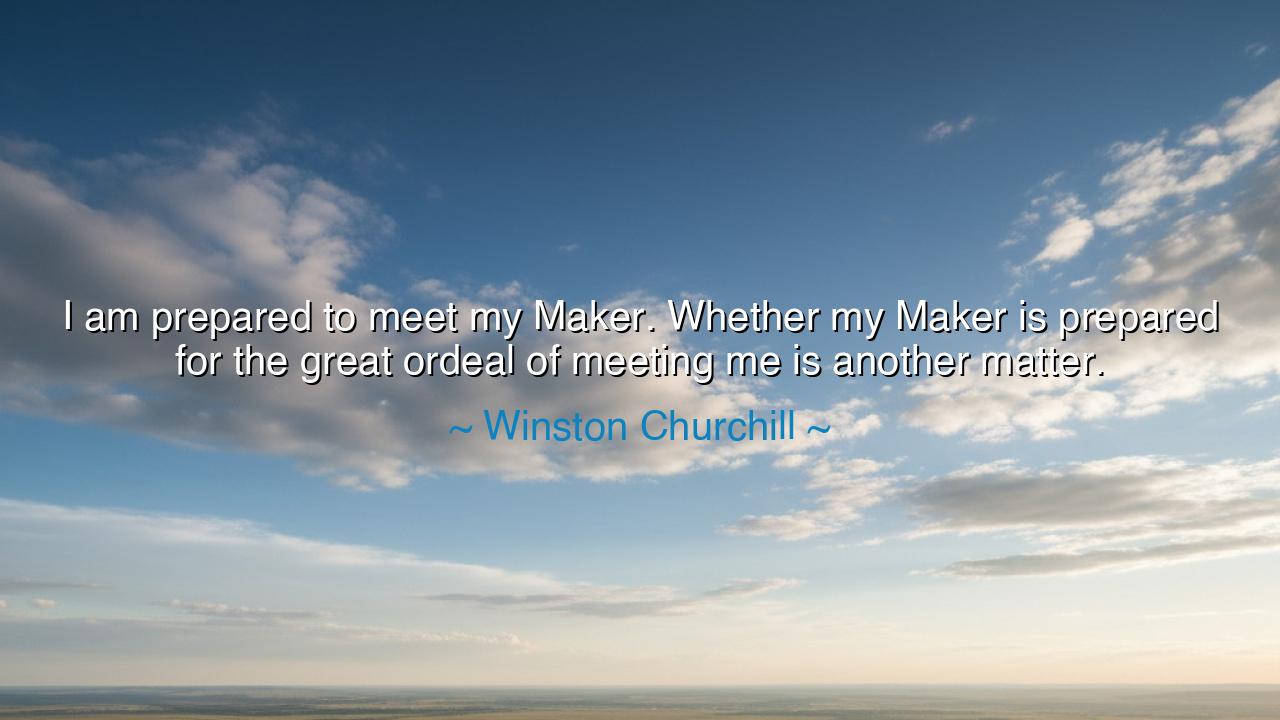
I am prepared to meet my Maker. Whether my Maker is prepared for
I am prepared to meet my Maker. Whether my Maker is prepared for the great ordeal of meeting me is another matter.






“I am prepared to meet my Maker. Whether my Maker is prepared for the great ordeal of meeting me is another matter.” — Winston Churchill
In this line, Winston Churchill, the lion-hearted statesman of Britain, speaks not only with wit, but with the full weight of a man who has stared into the face of destiny and laughed. His words, though laced with humor, carry the proud and defiant spirit of one who has lived greatly — a man unafraid of judgment, for he has already been tested by the fires of history. When Churchill speaks of being “prepared to meet his Maker,” he accepts the inevitability of death; but when he wonders whether his Maker is prepared for him, he reveals the essence of his character: courage, irony, and the restless confidence of a man who has met every ordeal on earth with boldness and wit.
To understand the depth of this statement, one must remember the world that forged it. Churchill lived through two world wars, carrying the burden of leadership when all seemed lost. He stood against tyranny, isolation, and despair, armed not only with armies, but with words — words that lit the fires of hope in a darkened world. He had faced death many times before — on the battlefield, in the skies, in political exile — and he met it all with a kind of grand, unflinching humor. So when he spoke of his Maker, it was as a warrior might speak to a king — with reverence, yes, but never with fear.
In this quote, there lies a lesson about the human spirit’s relationship with mortality. The ancients taught that to live nobly is to die unafraid. Socrates, before drinking the hemlock, spoke calmly to his friends, saying that death was either eternal rest or the beginning of wisdom. Marcus Aurelius, the philosopher-emperor, wrote that a man should meet death with the same calm as he meets sleep, for both are natural ends of life’s labor. Churchill’s words echo these ancient teachings, yet add his own defiant grin — a challenge, almost, to the divine itself: “You have made me strong and willful; now, are You ready for what You’ve made?”
This attitude is not arrogance; it is the courage of self-knowledge. Churchill understood his flaws — his temper, his pride, his indulgence — yet he also knew his virtues: his perseverance, his service, his devotion to his people. He lived as one who burned brightly, and such souls do not go gently into the night. When he jokes about his Maker’s “ordeal,” it is as if he admits: “I am imperfect, but I am real; I have lived fully, fiercely, and without pretense.” In that, he reflects the truth of every great life — that to meet death with humor is to rob it of power.
History offers many who have faced their end with similar bravery and grace. When the Spartan warrior Leonidas marched into battle at Thermopylae, he knew he was walking into death, yet he did so with pride, declaring, “Tonight, we dine in Hades.” When Joan of Arc was led to the pyre, she lifted her eyes to heaven and said, “Hold the cross high so I may see it through the flames.” Churchill’s jesting tone belongs to this same lineage of courage — those who greet fate not with trembling, but with laughter, as if to say: “You may take my body, but you cannot take the grandeur of my spirit.”
Thus, Churchill’s words remind us that preparation for death is not found in silence or fear, but in having lived with conviction. To be “prepared to meet one’s Maker” means to have acted with purpose, to have stood for something, to have lived a life so full that even the heavens must pause to take note. The jest hides a deep truth: that the most powerful offering we can make to our Creator is a life courageously lived — a life that challenges, questions, creates, and endures.
So, O seeker of wisdom, take this lesson to heart: Live so fiercely that even eternity must take notice. Do not shrink from your flaws, nor apologize for your passion. Strive, struggle, build, and dare greatly, for your life is your offering. And when your time comes, meet your Maker not as a beggar trembling before judgment, but as a soul who has fought, loved, and laughed without regret. Let your final words, like Churchill’s, carry both humility and fire — a testament that you lived as a human being in full, and that your spirit, even in departing, remains unconquered.






AAdministratorAdministrator
Welcome, honored guests. Please leave a comment, we will respond soon